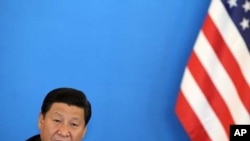Chinese Vice President Xi Jinping is scheduled to visit Washington next week. The man widely believed to be in line to become China’s next leader arrives during a series of high profile disagreements with Washington about Syria and Tibet.
During recent high profile meetings, China and the United States have made great effort to stress how important it is for the two countries to work together.
Foreign Ministry spokesman Liu Weimin repeated that emphasis Tuesday, when talking about Vice President Xi Jinping's trip to the United States next week.
China, he said, hopes the visit will enhance strategic mutual trust, expand practical cooperation, deepen people to people friendship and - most importantly - maintain what he described as the “steady and healthy development of Sino-American relations.”
In a speech carried on the Chinese Foreign Ministry's website Tuesday, Vice Foreign Minister Cui Tiankai described a “trust deficit” between China and the United States. Observers tend to point to disagreements between the two countries despite growing economic and political ties, said Cui.
China recently joined Russia in vetoing a United Nations Security Council resolution on Syria that was backed by the United States. Secretary of State Hillary Clinton called the veto a “travesty.”
Reporters asked the Chinese spokesman whether this serious differences of opinion between Beijing and Washington would overshadow Xi's visit.
But Liu said differences between the world's largest developing and developed nations are normal, adding that the key is that both counties should respect each other and treat each other as equals when exchanging views.
Xi is expected to be confirmed as China's top official later this year, and one purpose of this trip is to introduce him to the United States and the rest of the world. After he visits the White House February 14, he is set to go to Iowa and California.
The Chinese leader is visiting the United States during a heated political year, when American presidential candidates are accusing China of unfair trade practices and manipulating its currency, damaging the U.S. economy.




